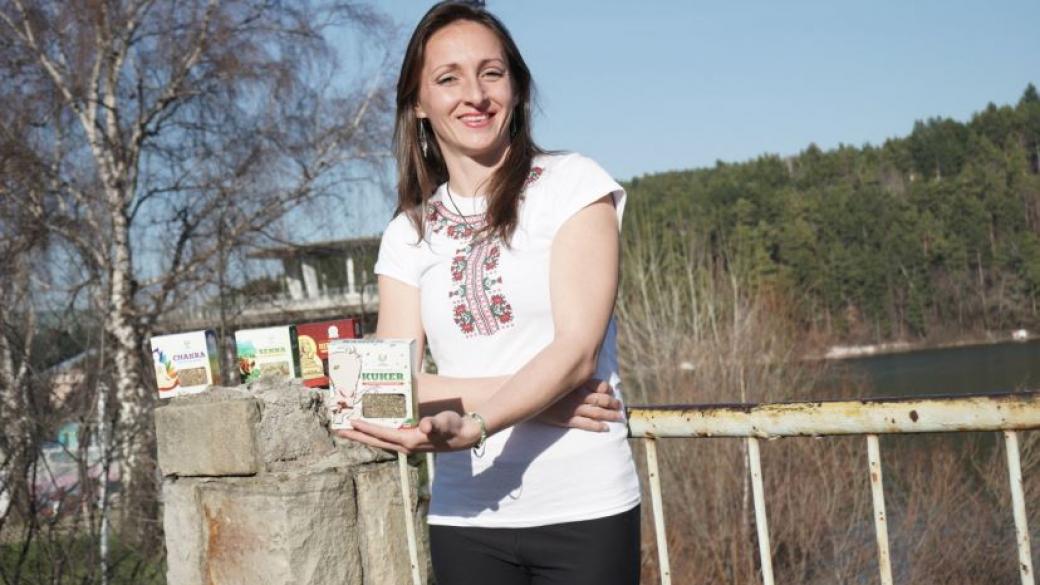Doing Business from the Student Bench.
Does academic entrepreneurship in our country enjoy the support of universities and investors

Най-ефективният начин за подкрепа е обучението на студентите отвътре-навън в стъпките „защо – как – какво“, казва Ангелина Ангелова
Angelina Angelova and Danail Koev are not typical entrepreneurs. According to statistics, the average age for starting a company is a little over 40 years in both Bulgaria and the United States. Danail opened his accounting office at his student dormitory in Sofia, and Angelina returned to Alma Mater after some academic wandering to further develop her tea processing and trading company abroad. Her company sells its own and foreign brands of tea under the Kuker brand in the UK, Germany, France, Italy and Spain through Amazon.
“My awareness of being an entrepreneur came after working in several corporations. I interrupted my studies in political science and devoted myself to development through practice with the attitude that this is enough for every successful businesswoman. It took me a while to realize that theory and practice go hand in hand for sustainable and long-term success”, says Angelina. She is currently studying marketing at NBU because “higher education is a complex process of being present in an academic environment, having self-discipline, making new contacts and honing knowledge and skills from an academic point of view”.
Danail Koev is the founder of the “Veda Accounting” accounting house, which works with IT and technology companies. "My student life lasted 8 years, which included two breaks, expulsion from the university, new application, exams. I started professionally in a grocery store chain, then worked as an operating accountant. In 2007-2008, the idea of my own business crystallized. In 2011, at the age of 25, I registered “Veda Accounting”. “I was a second-year accounting student at the University of National and World Economy and I lived in a dormitory”, says Danail. He clarified that he had not received support from his teachers. Rather, everyone was extremely sceptical and “there was no attempt to help me by mentoring or anything like that”.
Angelina is part of a growing group of students who have the opportunity for support and development at Alma Mater through various NGO and business initiatives and through more adaptive education. Access to venture capital, even with a basic entrepreneurial idea, is facilitated by the support of mentors.
“At the Faculty of Economics at Sofia University, we believe that student entrepreneurship is a way of learning economics and management and we support all methods”, said Vice-Rector Assoc. Prof. Dr. Todor Yalamov. The most common barrier for students with an entrepreneurial spirit is the high alternative cost of entrepreneurship. “Today, undergraduate students start working for large companies more easily, risk-free and with a higher income. When they gain experience and money, they sometimes risk creating something of their own. People with more life experience, already entrepreneurs, or having such an intention come to the master's programs and qualification courses. They have different problems. Our role is not only as teachers and mentors, but also to find the right mentors from the business for our student-entrepreneurs”.
Venetsia Netsova-Angova, a judge at the Academy of Innovation 2020, adds that helping to set goals and build a network of contacts often lead risky investors directly to students. She clarifies that the level of participants in the hackathon is rising steadily - the awarded projects better address a significant and justified problem, with a clear target audience, with knowledge of the industry and the competition, which shows that both universities and young people understand the nature of business.
Therefore, although there are no statistics, Assoc. Prof. Yalamov is sure that in Bulgaria there are many examples of classic academic entrepreneurship (professors and doctoral students who commercialize their research or simply have a consulting business), as well as student entrepreneurship. About 25% of his students last year had an entrepreneurial initiative, and as many of his fellow teachers, too. The Faculty of Economics organizes student exchanges under the Erasmus for Young Entrepreneurs program, provides business resources for students and maintains an active community. “We can do more and better, but we rely on donations or insignificant financial support for projects, which is not very sustainable.”
“Therefore, I strongly recommend each student to be proactive and seek contact with supporting organizations and mentors”, advises Daniel. He is surrounded by many 35-year-old friends waiting for the right moment to start a business. At the same time, the price that a student would pay for failure is many times lower than when one bears family responsibilities, housing mortgages, etc.
According to Angelina, academic theory expands the “capsule” of the entrepreneurial idea, creating a context - with knowledge of proper analysis, with an environment and opportunities for well-functioning techniques that make working with prospective clients easier and more promising. “Combined with the direction that education gives and the support of teachers, every student who is aware of their entrepreneurial spirit has the incredible opportunity to build a business successfully”, she says. But before that, she had to overcome the mistrust of speaking openly about her business intentions. “This lack of trust has melted away, thanks to the high professionalism and care offered by my teachers. The support I received was and is in the form of advice, guidance, contacts, understanding. But success is entirely in your hands”.
One of the most serious challenges that the student-entrepreneur is faced with remains to convince any business owner that it is sensible to entrust their finances to a “fresh student who comes to meetings by public transport”, adds Daniel. "Even the tiniest chance of “securing” a client would have evaporated irretrievably if I had shared that my “office” was actually a student dormitory. I often had to lie that it was currently being under construction”, he explains.
All four of them urge students to take risks with their own business, but consciously and with a willingness to learn and fail safely, at least for a few years. The debate over if and when the university brings added value for start-ups remains, but student entrepreneurship is evolving and not waiting for permission from institutions, Alma Mater or clients to move forward. The rest is just business.


